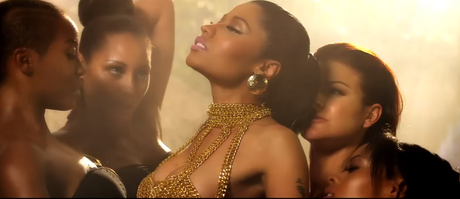
Nicki Minaj in "Anaconda"
Typically, the heterosexual male gaze controls the depiction of women’s bodies and sexuality in pop culture. Music videos especially tend to enforce the idea that female sexuality is defined by what is pleasurable for men. However, some female artists have recently been trying to combat these conceptions about women’s bodies and sexualities in their music videos – to various degrees of success.
Nick Minaj’s new music video, Anaconda, which has an unapologetically sexual overtone, is a major recent attempt at this. Many have criticized the video for being too sexually charged, and support themselves with the claim that Minaj is forcing girls to sexualize themselves at such a young age. Despite this moral outrage, though, it’s evident that Minaj actually benefits young women by claiming her own sexuality in this music video. For example, there is only ONE man in this video. Minaj is surrounded by women whose worth is not determined or defined by men, but instead is self-defined. The women in this video ultimately accept and embrace their own sexuality.
Perhaps this depiction is seen as threatening because our culture historically can’t comprehend any women (but especially black women) claiming their sexuality beyond the control of the heterosexual male. As many feminist scholars have noted, the black female body is equated to their history in this country as sexualized slaves who were seen to exist purely to satisfy the needs of others. The black body is still shamed, dehumanized, and considered under the ownership of others because of the legacy of slavery. The fact that Minaj isn’t trying to please anyone in the video sets us all off because she is the only person in control of her body and our culture historically can’t understand that.
Minaj has also been shamed for revealing so much of her body. Yet, we fail to realize that white women have presented scantily black female bodies in their videos as well – but because those women are presented as objectified props rather than the videos’ subjects, they haven’t faced the same type of criticism. The twerking black women in Miley Cyrus’s We Can’t Stop video aren’t shamed for being scantily clad because they are not presented as being in control of their sexuality. Cyrus uses them to promote her own credibility as an artist and the women themselves are seen as props used to achieve this goal. Similarly, Lily Allen’s Hard Out Here uses black women solely for their bodies. She sings the lyrics “don’t need to shake my ass for you ‘cause I’ve got a brain” while black women do precisely that and, thus, establishes her separation from those racialized bodies and her dominance over them.
However, while Minaj does manage to own her sexuality in this video, it’s worth noting that her lyrics contradict the strong depiction of women owning their bodies generally. In fact, there seems to be a growing trend of certain groups of women gaining empowerment by denigrating dominant ideas of female beauty and the women who do actually fit those categories. What may be intended as an empowering claim to an alternate ideal of beauty ultimately creates misogynist antagonism by disparaging another group of women. For example, Meghan Trainor’s All About That Bass promotes self-love and acceptance, yet she ridicules the “skinny b******” and declares how she’s not a size two. She uses that proclamation to elevate herself and justifies it because “all the right junk in all the right places” is what “all the boys chase”. Likewise, Minaj does the same by pointing out how “he can tell [she] ain’t missing no meals” and “say he don’t like ‘em boney, he want something he can grab.” These sentiments not only disparage thin women, but establish a “curvier” beauty ideal as existing through the heterosexual male gaze. A curvier body type isn’t inherently acceptable – it is only acceptable because it’s what heterosexual men want. When Minaj sings “I said where my fat ass big b*****s in the club/ F*** the skinny b*****s, f*** the skinny b*****s in the club/ I wanna see all the big fat ass b*****s in the motherf*****g club/ F*** you if you skinny b*****” she may be attempting to empower women by belittling the “skinny bitches”, but ultimately only creates more barriers and competition.
Ultimately, Nicki Minaj and other artists are doing important work by pushing back on the oppression of women. They just need to be better aware of not creating new forms of boundaries and oppressive categories in their attempts to do so.

